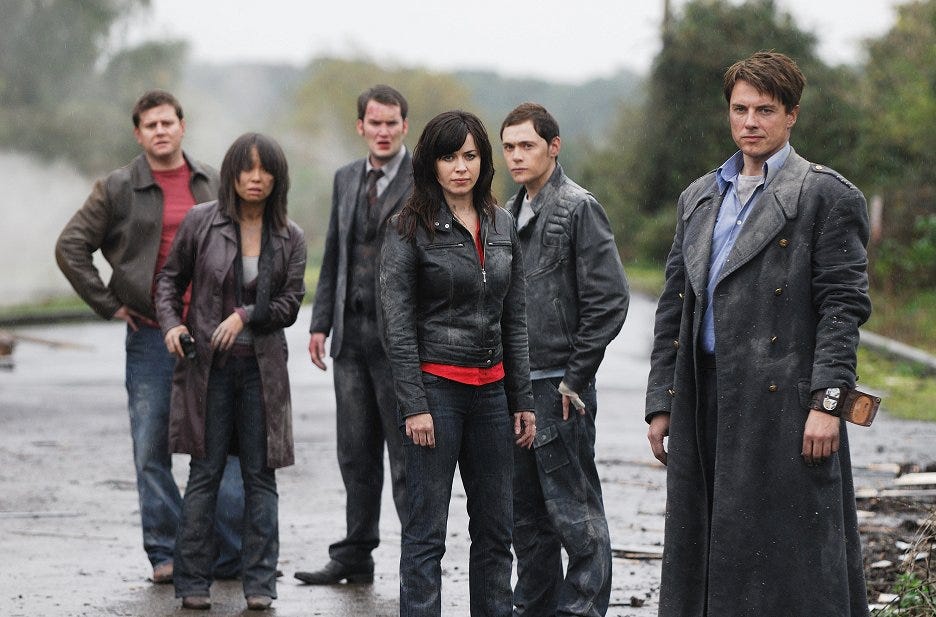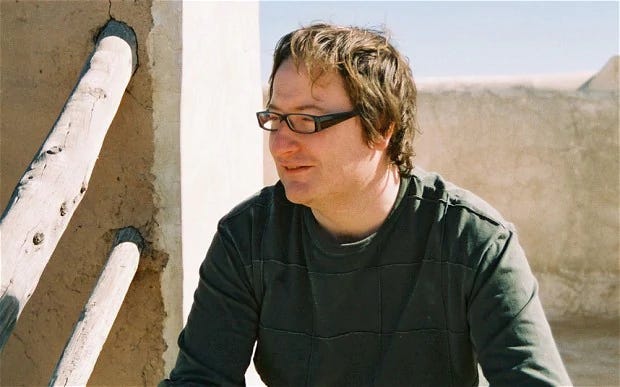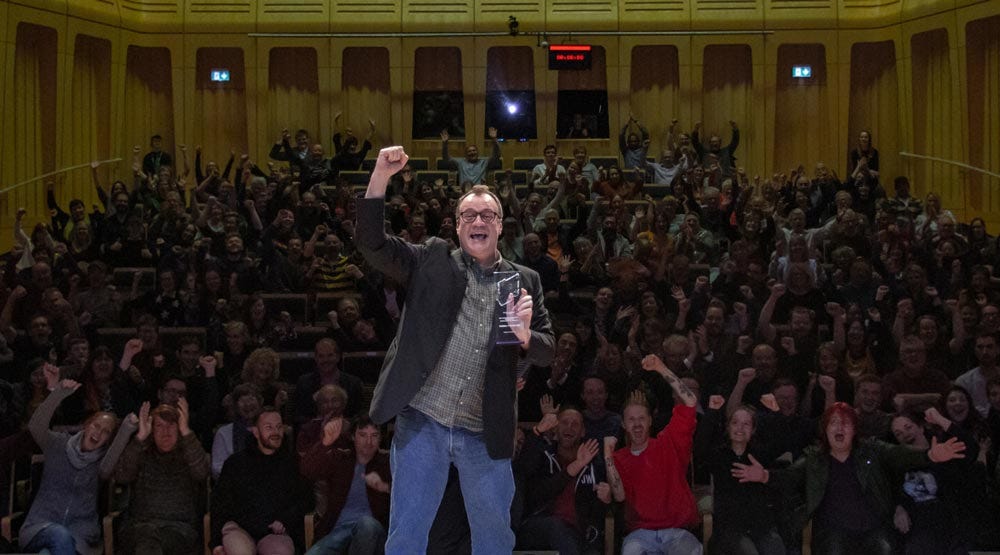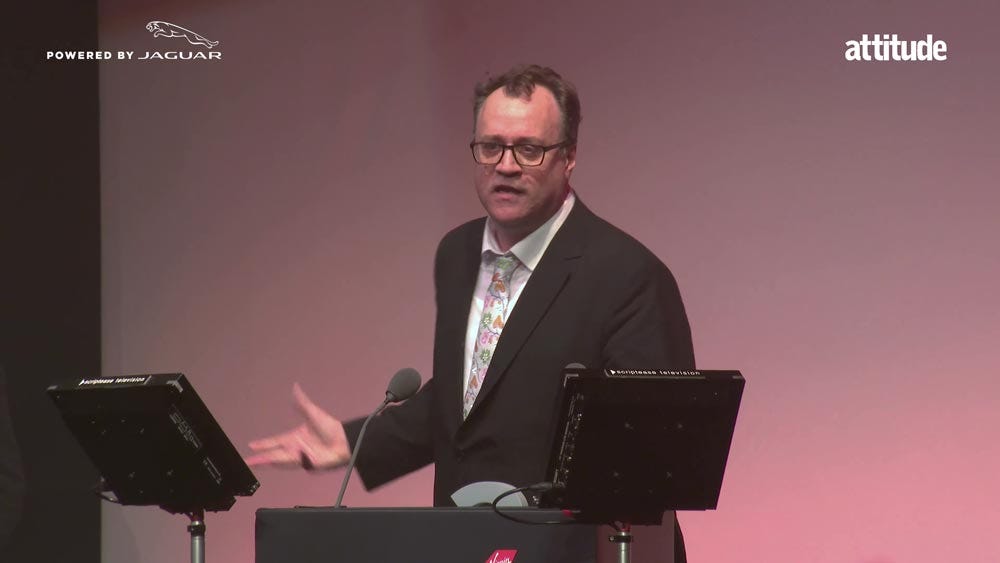(Note: this essay is part of a series.)
Doctor Who (2005-10) was free of the more aggressive wokery that was to come in the 2010s, but that was trialled in the contemporaneous spin-off Torchwood (2006). When the main show proved a ratings smash, the BBC rushed to capitalise and showrunner Russell T Davies was allowed to create two spin-offs. The other was The Sarah Jane Adventures. Being a children’s show in 2007, it was not the arena for experimenting with pushing boundaries - but Torchwood was.
Unofficially billed as “Doctor Who for grown-ups”, it screened after the watershed on BBC Three, a channel aimed at teens and 20-somethings. Davies told SFX magazine:
We can be a bit more visceral, more violent, and more sexual, if we want to. Though bear in mind that it’s very teenage to indulge yourself in blood and gore, and Torchwood is going to be smarter than that.
But it wasn’t smarter than that. It was utterly stupid, which is perhaps why it ended up being popular with the BBC Three audience, so juvenile was its use of swearing, violence, gore, sex… and sexual deviance.
In this stream the host concedes that Torchwood was “gay”, but claims it wasn’t “annoyingly gay”. I beg to differ. Some people are in danger of thinking “all this woke stuff” only started in 2015. As we have seen, it was present long before that, just kept more subtle and less doctrinaire. Crucially, it was never prioritised over things like plausibility and enjoyability.
In fact, Torchwood might have been the show that changed all that and made political correctness an obnoxious priority. It was certainly the first drama I saw that placed huge emphasis on (what we now call) wokery while failing on all of the standard metrics (storyline, characters, acting, plotting, tone, depth). For this, we can thank not so much Russell T Davies as Chris Chibnall, the man he put in charge of the spin-off while he focused on Doctor Who.
Chibnall lacked Davies’ talent, in every way, and it shows in the abysmal first season of Torchwood. The first episode I saw, Ghost Machine, astonished me with how bad it was, how incompetently written and dreadfully acted.
I caught some later glimpses of that season and found myself, every time, awestruck by its awfulness. The absolute joke that was the episode Cyberwoman, for example, requires no elaboration when I can simply show this image:
Remember this is a show supposedly “for grown-ups”. And remember the fictional Torchwood team were supposed to be a crack unit of seasoned, grizzled, hard-headed expertly-trained professionals… but it turned out that one of them, the mercurial sperg Ianto, had somehow smuggled Lisa, his partially cyber-converted Black ex-girlfriend, into their top secret HQ, along with a huge apparatus for keeping her alive, and stored her there for months unbeknownst to his colleagues. He did this even though it breached every security protocol you could imagine and was grossly irresponsible. (But he was in love, don’t you see?!) When Lisa runs amok and attacks his colleagues, and they attack her in response, Ianto attacks them! Does he get sacked for any of this? Of course not. They understand: he’s in love! A farce in equal parts lamentable and laughable.
Another example, not of wokery but of sheer incompetence, was the episode Countrycide. In this, the Torchwood gang busted a cannibal cult and hysterically (they were always hysterical) begged the vanquished cult leader to explain why he insisted on eating people. This was the moment the episode had been building towards for 45 minutes, when the storyline is “explained” in-world and the drama’s treatment of its subject is crystallised. What did we get? The cannibal simply said “because it made me happy”. That’s it. That’s all the depth the writers felt this topic needed. Simply shameful.
But, meantime, you had every member of the Torchwood gang sleeping with every other member, male or female. Plausibility and consistency went out the window; only novelty mattered, and vicarious excitement for sex-starved female viewers, many of them confused Tumblristas.
The show might have been appalling, with terrible dialogue, shallow characters and half-baked plots, but it “pushed the boundaries” of sex. For the hyper-politicised generation of new viewers that Davies was cultivating, this was all a programme needed for them to keep watching, keep buying the DVDs, the merch, and even a magazine:

This drivel electrified a young generation of people who were plugged into the nascent identity politics of gay, trans, otherkin, furries, etc. that was just emerging in the mid 2000s. As a result, Torchwood proved a hit.
Davies wanted children to be able to watch it, so for its second season he purged the scripts of profanity and overt sex, and the show was moved to a 7pm (pre-watershed) slot on mainstream channel BBC2, then BBC1. Also, he took more of a role in the show’s third and fourth seasons, because Chibnall either left or was sacked as showrunner. Perhaps the deficiencies of his work were harder to ignore once the show was on primetime.
Torchwood is vital for our examination because it shows two things:
that Doctor Who would reach a quality nadir if Chibnall were ever put in charge of it (and thus the BBC would end up in a desperate position, beholden to Davies)
what Davies would do with Doctor Who if the BBC were beholden to him
On the main Doctor Who show, Davies was comparatively restrained. But, based on the evidence of 2024, I think he would have loved to be much more aggressive, and it was only the commercial imperative, probably subtle pressure from his superiors, and almost certainly a self-interested understanding on his own part, that held him back. This was to the show’s benefit and his own. Had he let rip, Doctor Who (2005-2010) would have been a complete failure and he would have destroyed his reputation and career.

Instead, he got the best of both worlds: pushing the gay message, but with enough restraint that he was lauded as a trailblazer and became a commanding figure in British television.
After leaving Doctor Who, Davies made a pledge. While you might think his tenure on the show had been gay-friendly, even excessively so, he apparently felt a bit of a sell-out for not going even farther. As a result:
Since I left Doctor Who, I took a decision that I was going to write gay scripts for the rest of my life
As of 2024, he has kept to that pledge. Also:
he is determined to talk about being gay - and about gay rights - in “every interview I do”.
He seems like a man obsessed. It’s very much the “only gay in the village” mentality, where a gay guy is convinced that everyone secretly resents him for being gay and is on the brink of removing his rights, so he must continually fight. He basically says as much:
While those people [who ask why we need gay representation] are still angered by it, that’s why we should do it.
As long as anyone still dares to complain about gay representation, there is a need for gay representation. This is a siege mentality, a persecution complex, and one that will brook no opposition whatever. It is not enough for Davies that his kind are accepted; those who accept only grudgingly must be silenced. (This shrill attitude is relevant because it is the seed of his future failure when he returns to Doctor Who.)
He is also paranoid about society “going backwards”:
This country is always in the shadow of America, and when you watch what’s happening there, I am worried. Gay rights, women’s rights and black rights are paper thin. I have been saying that for decades. In fact, I get tired of saying it. When you have the President of America being racist... how did we get here? Why aren’t we taking to the streets? And why aren’t we standing up against him? It’s a disgusting age.
At that time (2019), the so-called right-wing Tory government had instituted gay marriage, was overseeing the highest immigration numbers Britain had ever seen, and was proudly celebrating trans rights… yet Davies was paranoid. His evidence, his only evidence, seems to be that Trump was “being racist”. Presumably that is a reference to his “shithole countries” comment - but I don’t see Davies singing the praises of those countries. Indeed, in It’s a Sin (2021) he himself has a character say this about gay rights in Nigeria:
if they send you back home, [the Nigerians] will beat you, and bleed you. In the name of God, they will kill you. And then they’ll throw your body into the forest and leave you for the animals.
When it comes to it, Davies knows damned well that Trump’s comment was accurate. But he will vilify him for saying it anyway. He will advocate that people “take to the streets” to punish a man for saying what he (Davies) knows to be the truth. Sheer insanity.
To list some relevant things Davies did while away from Doctor Who…
In 2015, he wrote a show called Cucumber about middle-aged gay men in Manchester, a sort of sequel to Queer as Folk. It had a concurrent spin-off, Banana, targeting youth demographics and also written by him.
In 2016, he adapted A Midsummer Night’s Dream and inserted gay elements, justifying this with the “current year” argument:
It’s very male-female, male-female, so I wanted to have a man with a man, a man who was dressed as a woman with a man, and a woman with a woman because it’s 2016, so that’s the world now.
I wanted children to watch this and see the real world in the middle of this fantasy.
In 2019 he was made a fellow of the Royal Television Society Cymru. Hundreds of his fans gathered to watch him be given this prestigious award and chat about his career and the TV industry. To what looks like an entirely White audience, he declared:
I think television is astonishingly… white and straight and straightforward, as well. It’s 2019 now and you’ve got to get with it.
No doubt they all clapped like seals.
In 2020 he wrote the script for an online Doctor Who production about former companions. He used this opportunity to say that two female companions from the early 1980s, Tegan Jovanka and Nyssa, were in a relationship. This production was made for the official Doctor Who YouTube channel and is therefore considered canon, so he has officially made two characters gay forty years after the fact, even though there were no signs of this inclination during their time on the show.
In January 2021 he made the controversial remark that gay roles should only be played by gay actors. To be fair, he had an interesting argument for this:
if I cast someone in a story, I am casting them to act as a lover, or an enemy, or someone on drugs or a criminal or a saint... they are NOT there to “act gay” because “acting gay” is a bunch of codes for a performance.
It’s about authenticity, the taste of 2020. You wouldn’t cast someone able-bodied and put them in a wheelchair, you wouldn’t black someone up. Authenticity is leading us to joyous places.
While I actually have sympathies with this argument, I will point out that it would have deprived Queer as Folk of its three lead actors.
That same month saw the broadcast of his new high-profile drama, It’s a Sin, exploring the 1980s AIDS crisis. What is significant about this is that, in contrast to his long-time mantra of doing drama that is character-led, It’s a Sin was explicitly issue-led. While I believe the AIDS crisis was a story he had wanted to tell (or an issue he had wanted to explore) all through his career, its finally happening at this juncture points to a new issue-centred approach in his writing. This would tally with the woke media of the 2010s.
In August 2021 he criticised an American streaming show for its lacklustre gay representation after its director appeared to congratulate herself for merely having a character come out as bisexual. (Every show must have multiple gay characters, apparently.)
In October 2021 he gave a speech in support of trans rights, specifically lambasting the LGB Alliance for excluding trans rights from their campaigning.
This very short speech demonstrates Davies’ strengths and weaknesses. He is trying to be serious but all he can manage is mawkish sentimentality. He is trying to construct a logical argument but is utterly un-logical and must rely on the deus ex machina of humour. He is appealing to basic decency but actually pursuing rank libertine license. He cannot explain why this license should be given, except by making the emotional point that the lack of it feels bad, in the moment.
His strength is in psychology, not logic. You can get away with this as a writer of drama - just - but are fully exposed when you attempt to make a political argument in the real world. There, a flair for psychology is advantageous but not sufficient.
Furthermore, he must exaggerate the emotions to a level of bombast. He does not merely say that lack of tolerance feels bad, but that it “kills”. This is ludicrous.
The point of going over what he did in the interim is to show that the signs were there as to how his second tenure would be. I think a lot of people, myself included, simply didn’t imagine that he would so lose sight of what made his first tenure successful, that a man so attuned to human psychology would become so tone-deaf.
But before we get to that, we have to examine how the BBC became so desperate as to give him free rein.











Davies is simply a useful idiot, parroting just what his overlords want him to parrot. Perhaps when he is older he will be a sad and bitter man, if he isn’t already, reflecting that he pushed the agenda much much too far, much, much too quickly, resulting in the atrocity that was the Olympic Games opening ceremony in Paris last week. A backlash will likely, hopefully, ensue; perhaps it may even become very ‘uncool’ to be so flagrant about one’s sexuality, and as for pronouns and all the fetishes that are lauded at gay ‘pride’ events….well, deeply, deeply uncool - the documentary evidence of these idiotically vile spectacles will be removed form the internet, or kept as as a warning from history, depending on the nature of the regime we are living under.
As for AIDs, everyone should learn about how this ‘virus’ was as completely made up as ‘Covid’. AIDS is simply a set of illnesses, caused by the gay bathhouse scene - the use of ‘poppers’, the contracting of venereal disease, illegal and prescription drugs, including antibiotics over-used to treat sexual transmitted diseases; and of course, there was the very toxic AZT. In African ‘Aids’ is simply malnutrition and TB, and all the other diseases that come from poor sanitation and water supply. ‘AIDS’ has a very different set of diagnostic tools in Africa than it does anywhere else in the world.
It’s all very evil, especially what these ‘medical’ practices do to babies and children. Perhaps one fine day the perpetrators will hang, and men like Davies will be shunned. It’s probably unlikely he will ever know shame for his contribution to this evil.
I regard Russell T. Davies as genuinely evil. It does not surprise me at all that he has denounced gays and lesbians who refuse to bend the knee to the trans tyranny. Davies exhibits the vicious gay militancy that was on display as far back as the 1980s, when the gay activist/singer Jimmy Somerville of The Communards excoriated the ‘old gays’, singling out beloved entertainers John Inman and Larry Grayson for particular attack. They were the gay equivalents of ‘Uncle Toms’ according to Somerville, disgraceful stereotypes pandering to the straights. In middle age, Somerville reflected on the vicious attack on Inman in particular with a morsel of regret, but the damage was done by then. Plus he’d allowed the mask to slip.
I’m sure Davies feels the same way about the gay actor James Dreyfuss, who has had his career ruined by his refusal to bend the knee. He no doubt thinks TERFS and old style gays and lesbians, and Christian homeschoolers like me too come to think of it, are just on the wrong side of history and we all need to go away and shut up. Just like Davies’s Who-handmaiden Tennant told Kemi Badenoch to do last month - quite breathtaking to see a straight white privileged male tell a black woman to shut up…
Davies must really be living his best life these days - how fortunate for him that so many gay men died of AIDS to build him his soapbox.